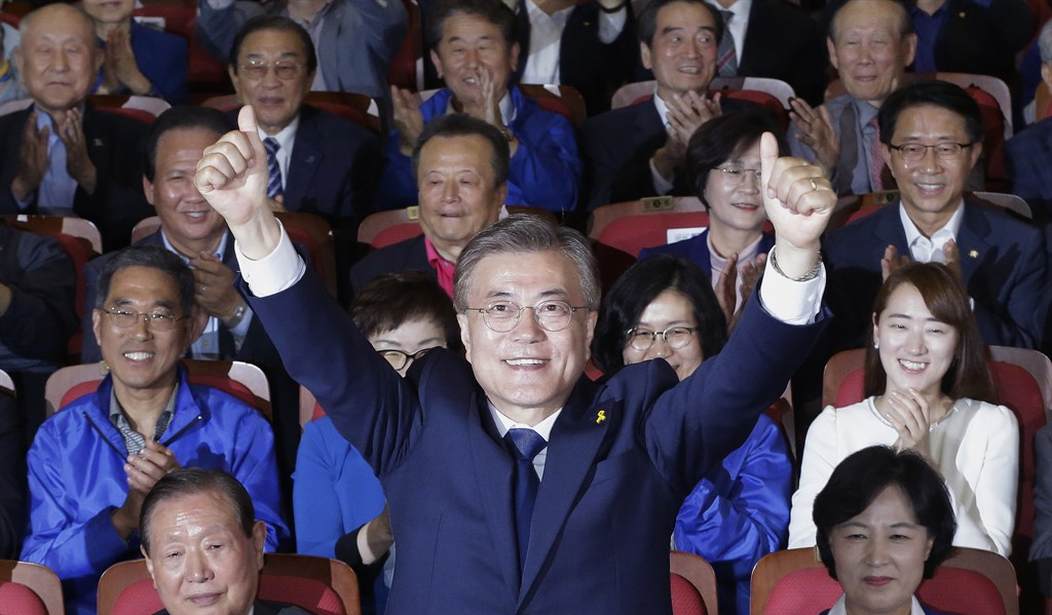At first, all we had were exit polling for the South Korean elections — and we all know just how infallible exit polling is at predicting outcomes, right? In this case, though, the gaps were large enough to guarantee a big win for Moon Jae-in, the progressive presidential candidate who will take office to replace disgraced conservative Park Geun-hye, who went directly from the Blue House to the hoosegow. His opponents conceded before results got published:
Two major challengers for South Korean president, a conservative and a centrist, conceded defeat Tuesday, paving the way for liberal Moon Jae-in to claim victory in an election that followed months of political turmoil caused by ousted President Park Geun-hye’s corruption scandal.
The concessions by conservative Hong Joon-pyo and centrist Ahn Cheol-soo followed exit polls that earlier forecast that Moon would win, ending a decade of conservative rule in South Korea and setting up a sharp departure from recent policy toward nuclear-armed North Korea.
That outcome may complicate the new get-tough US policy toward North Korea:
Moon Jae-in, a progressive candidate who favors closer ties with North Korea, looked set to become South Korea’s next president, according to exit polls released shortly after voting closed Tuesday.
The snap election was called following the impeachment of former president Park Geun-hye over corruption scandal. South Koreans are eager to put the turmoil of the past six months behind them and restore stability at a time when President Trump has tough words for both South and North Korea and when Kim Jong Un’s regime is issuing a steady stream of threats and missiles.
But Moon’s likely victory could open a new and potentially difficult chapter in relations with the United States as Moon wants to resume engagement with North Korea while the Trump administration is calling for pressure and punishment.
Why give up so soon? The exit polls don’t predict a squeaker. Moon has 41% of the vote among the three major candidates, while conservative Hong Joon-pyo got 23.3% and outsider Ahn Cheol-soo got 21.8%. The biggest mystery will probably be which of those two can claim runner-up status. It’s a measure of the damage to the country’s conservative movement from the Park scandal that they may fall all the way to third place, but it’s not surprising either. South Korea just went through a scandal roughly the equivalent of Watergate — had Nixon been arrested coming out of the White House. Conservatives will probably rebound over the next few years, but they have a demographic problem too, as they tend to be significantly older than progressives, and this scandal will likely make that situation worse.
Moon’s win portends some awkward moments for the Trump administration. Moon criticized the rush to install the THAAD anti-ballistic missile system over the last two weeks, and that might have to get renegotiated, but that’s not the only problem for the US. Donald Trump has set out on a policy of aggressive confrontation as a means to get China to finally do something about its client state, but Moon wants to return to the softer engagement of the pre-Park period. The White House has to hope that Moon will have his hands full with domestic-policy issues, especially on the income-inequality problems that his progressive base prioritizes over foreign policy. However, North-South issues usually dominate at that level, and those are domestic policies in their own way too.
Pyongyang suggested that Moon’s election might smooth the way to better relations:
North Korea’s official media have not mentioned Moon by name but said it was time to deal the conservatives a crushing election defeat so the two Koreas could put a period of confrontation behind them.
“We should end the history of North-South confrontation that has been continued by the puppet conservative group, and we as the same race should gather our strength to open a new era of independent reunification,” the North’s official Rodong Sinmun newspaper said on Monday.
Moon will certainly try to get the Kim regime to bargain in good faith, but we’ve been down that road before, too. The question will be just how much Moon concedes in that effort. Pyongyang will want an end to joint military drills with the US as an ante just to get to the table, and eventually the eviction of all US military personnel. Presumably Moon won’t go that far to get North Korea to back off its nuclear-weapons program, and if he tries, the US might have some economic leverage to convince him it’s a bad idea.
If not, then perhaps Glenn Reynolds is right. It may be time to revive the Duck and Cover drills:
But now we face a situation where things look a lot like the earliest days of the Cold War, where we faced a handful of Hiroshima-sized atomic bombs, not the (literally) thousands of bombs often (literally) nearly a thousand times stronger than the Hiroshima bomb that were around by the late 1960s. We no longer face such a Strangelovian apocalypse, but rather an attack with one or a few atomic weapons of Hiroshima size, from places like North Korea or Iran. So maybe the old duck-and-cover training (which was based on the experiences of Hiroshima and Nagasaki survivors) makes sense again.
The Obama administration seemed to think so when it rolled out some civil defense plans aimed at responding to such an attack over half a decade ago. The idea was to teach people what to do in the event of such an attack, and it sounded a lot like the old “duck and cover” advice, because while politics may be different than they were in the Truman era, physics are the same.
When an atomic bomb explodes, it produces a brilliant flash of light, which after a few seconds turns into a wave of searing heat, which is followed by a powerful blast, and then, 30 minutes or an hour later, by radioactive fallout. If people know what to do, they can seek shelter as soon as the flash of light appears (instead of going to the window to see what’s happening, a natural but fatal response). If they can shelter from the blast (which kills mostly through flying glass and other objects) then they have a little while to find a basement or something before the fallout settles. Even a couple of days of sheltering from the fallout from a Hiroshima-sized bomb makes a huge difference (the radiation falls to 1/10 the intensity in 7 hours, and to 1/100 the intensity in 49). But people won’t do that unless they’re trained to.
We seem to have bought into Francis Fukuyama’s “end of history” hypothesis even more than previously thought. The Korean peninsula crisis has not just begun, nor will it end soon. And we should be at least educated on the worst-case scenarios.








Join the conversation as a VIP Member